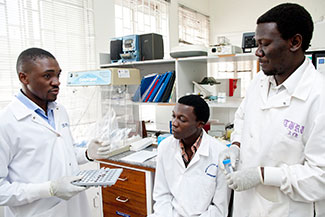$17M is awarded to support HIV, disease ecology, mHealth projects
July / August 2018 | Volume 17, Number 4

Photo by Richard Lord for Fogarty
With support from Fogarty's HIV Research Training Program,
grantees will work in collaboration with academic institutions
in LMICs
grantees will work in collaboration with academic institutions
in LMICs
Fogarty is awarding about $17.5 million in grants for HIV research training, virus transmission studies and the development of mobile health tools for research in low- and middle-income countries (LMICs).
HIV research training
The largest group of awards - expected to total about $13.5 million over five years - is to support HIV research training through grants being issued to nine U.S. universities. Working in collaboration with an academic institution in a LMIC, the grantees will train scientists in six African countries - Botswana, Kenya, Nigeria, Tanzania, Uganda and Zimbabwe - and in Indonesia, where the AIDS epidemic is accelerating. To reverse that trend, training for Indonesian scientists will develop advanced skills to effectively implement prevention and treatment measures. Several training programs for African scientists also focus on implementation science to manage HIV care and prevention efforts. Other training areas include HIV/TB epidemiology and application of geospatial tools to better understand and respond to the HIV epidemic.In addition, two smaller grants were awarded that will help LMIC institutions improve their research infrastructure - one project will enhance an institutional review board, and the other will focus on research administration and management.The NIH Office of the Director and National Institute of Mental Health (NIMH) co-funded some of the awards.
- About the Fogarty HIV Research Training Program
Ecology and evolution of infectious diseases
Another program, focusing on disease ecology, will provide $2.5 million over five years to the University of Illinois for studies that will use new phylogenetic and bioinformatics approaches to better understand virus transmission routes in a biodiversity hotspot in western Uganda. The research grant is funded by Fogarty through the Ecology and Evolution of Infectious Diseases Initiative, a joint program of NIH and the National Science Foundation.Mobile health technology and outcomes
To encourage exploration of mobile health (mHealth) solutions for low-resource settings, Fogarty is awarding about $1.5 million over two years to support four grants. A project in Costa Rica will develop mHealth tools enabling people in the community to identify and report insect breeding grounds to reduce vector-borne diseases. An effort in Thailand aims to lower HIV infection among young men who have sex with men by testing whether a social networking and game app can improve adherence to PrEP, the HIV medications that can diminish the risk of infection if taken daily. To help prevent cervical cancer, a project in Peru will study whether the colposcopy diagnostic procedure can be done remotely using mHealth technology. Telemedicine is also the focus of a program in Rwanda to see if it can be used to diagnose surgical site infections in women who have had cesarean deliveries.
2018 HIV Research Training Program awards
- Research Training Grants:
- Dartmouth College
Dartmouth-Boston University HIV-TV Research Training for the Infectious Disease Institute at Muhimbili University of Health and Allied Sciences
Contact PI: Dr. Lisa Virginia Adams - Duke University
Sociobehavioral Sciences Research to Improve Care for HIV Infection in Tanzania
Contact PI: Dr. John A. Bartlett - Harvard School of Public Health
Training in HIV/AIDS Prevention and Treatment Research in Botswana
Contact PI: Dr. Myron E. Essex - Johns Hopkins University
Multidisciplinary Research Training to Understand and Reduce HIV Incidence in Uganda
Contact PI: Larry William Chang - Northwestern University
Expanded Multidisciplinary NeuroAIDS Research Training to Improve HIV Outcomes in Nigeria
Contact PI: Dr. Babafemi O. Taiwo - University of California, San Francisco
Training for Research Excellence and Mentorship in Tuberculosis (TRENT)
Contact PI: Dr. John Z. Metcalfe - University of Illinois at Chicago
UIC/AJCU Training Program in Advanced Research Methods and Translational Science
Contact PI: Dr. Judith A. Levy - University of Washington
Improving the HIV Care Cascade in Kenya Through Implementation Science Training
Contact PI: Dr. Carey Farquhar - Yale University
TB and Other Pulmonary Complications of AIDS Research Training Program
Contact PI: Dr. John Lucian Davis - Infrastructure Development Training Grants:
- Johns Hopkins University
Supporting Performance of the Ethics Committee for Research (SUPER) in Ethiopia
Contact PI: Dr. Adnan A. Hyder - University of Washington
Infrastructure Development Training Program for Aga Khan University East Africa
Contact PI: Dr. Michael Hoonbae Chung
2018 Ecology and Evolution of Infectious Diseases award
- University of Illinois at Urbana-Champaign
Viral Transmission Dynamics at the Human-Wildlife Interface in Western Uganda
Contact PI: Dr. Rebecca Stumpf
2018 awards for Mobile Health: Technology and Outcomes in LMICs
- Duke University
mHealth-supported Telecolposcopy for Cervical Cancer Programs in Low-resource Settings
Contact PI: Dr. Lavanya Vasudevan - Duke University
Novel mHealth Technologies to Enhance PrEP Adherence among Thai YMSM: Collaborative Adaption and Evaluation
Contact PI: Dr. Sara H. LeGrand - Harvard Medical School
Telemedicine to Improve the Diagnosis of Surgical Site Infections Post-cesarean Delivery in Rural Rwanda
Contact PI: Dr. Bethany Hedt - University of Rochester
mZAP! A Mobile, Community-based GPS Mapping Surveillance Tool Empowering Communities to Alleviate Insect-borne Disease and Ecological Risk in Costa Rica
Contact PI: Dr. Timothy De Ver Dye
More Information
To view Adobe PDF files, download current, free accessible plug-ins from Adobe's website .































No hay comentarios:
Publicar un comentario